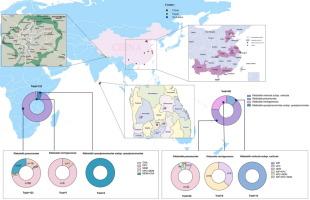克雷伯氏菌在城市水生环境中抗菌素耐药性的传播:一个多国家基因组的视角
IF 13
1区 综合性期刊
Q1 MULTIDISCIPLINARY SCIENCES
引用次数: 0
摘要
抗生素耐药性,特别是耐碳青霉烯肺炎克雷伯菌(CRKP),对临床和环境造成重大威胁,特别是在城市水生生态系统和医院废水中。目的分析城市水生环境CRKP分离株的流行病学和基因组学特征,评价其对公共卫生和环境的影响。方法与结果对中国、斯里兰卡、尼泊尔的113条河流和3家医院进行水样采集,分离出耐碳青霉烯类克雷伯菌。通过抗菌药物敏感性测试、全基因组测序和生物信息学分析来表征耐药表型、抗生素耐药基因(ARGs)和进化趋势。大数据分析进一步阐明了全球水源中CRKP的基因组特征,并利用mellonella幼虫进行毒力评估。统计分析证实了这一发现。从中国( = 60)和尼泊尔( = 132)的城市水生生态系统共鉴定出192株耐碳青霉烯克雷伯菌,其中以CRKP (n = 161)为优势种。所有的CRKP分离株都表现出多药耐药表型,但两国分离株在耐药谱和相关ARGs方面存在显著差异。共检测到9个碳青霉烯类耐药基因(CRGs),其中以blaNDM-1最为常见(57.8% %)。相关分析显示,这些CRGs与多个inc型质粒之间存在很强的相关性。对来自8个国家水源的CRKP进行全球基因组分析,确定了45种血清型中的10种不同的CRGs,其中KL64是最主要的。值得注意的是,在尼泊尔的水样中发现了耐碳青霉烯类高致病性肺炎克雷伯菌。我们的研究结果强调了CRKP患病率和ARG在城市水生环境中的传播存在显著的区域差异,尼泊尔的患病率最高,特别是在未经处理的河流中。中国的流行率较低,但耐药基因谱明显,而斯里兰卡未检测到CRKP,这突显了环境管理和卫生保健基础设施对ARG传播的影响。本文章由计算机程序翻译,如有差异,请以英文原文为准。

Dissemination of antimicrobial resistance in Klebsiella spp. from urban aquatic environments: a multi-country genomic perspective
Introduction
Antibiotic resistance, particularly carbapenem-resistant Klebsiella pneumoniae (CRKP), poses significant clinical and environmental threats, especially in urban aquatic ecosystems and hospital wastewaters.Objectives
This study aims to analyze the epidemiological and genomic features of CRKP isolates in urban aquatic environments and evaluate their public health and environmental impacts.Methods and Results
Water samples were collected from 113 rivers and 3 hospitals in China, Sri Lanka, and Nepal to isolate carbapenem-resistant Klebsiella spp. isolates. Antimicrobial susceptibility testing, whole-genome sequencing, and bioinformatics analyses were performed to characterize resistance phenotypes, antibiotic resistance genes (ARGs), and evolutionary trends. Big data analysis further elucidated the genomic characteristics of CRKP in global water sources, and Galleria mellonella larvae were used to assess virulence. Statistical analysis validated the findings. A total of 192 carbapenem-resistant Klebsiella spp. isolates were identified from urban aquatic ecosystems in China (n = 60) and Nepal (n = 132), with CRKP (n = 161) being the predominant species. All CRKP isolates exhibited a multidrug-resistant phenotype, yet significant differences in resistance profiles and associated ARGs were observed between isolates from the two countries. Nine carbapenem resistance genes (CRGs) were detected, with blaNDM-1 being the most prevalent (57.8 %). Correlation analysis revealed a strong association between these CRGs and multiple Inc-type plasmids. Global genomic analysis of CRKP from water sources across eight countries identified ten distinct CRGs across 45 serotypes, with KL64 being the most predominant. Notably, carbapenem-resistant hypervirulent Klebsiella pneumoniae was detected in water samples from Nepal.Conclusion
Our findings highlight significant regional disparities in CRKP prevalence and ARG dissemination across urban aquatic environments, with Nepal showing the highest prevalence, particularly in untreated rivers. China exhibited lower prevalence but distinct resistance gene profiles, while no CRKP was detected in Sri Lanka, underscoring the impact of environmental management and healthcare infrastructure on ARG spread.求助全文
通过发布文献求助,成功后即可免费获取论文全文。
去求助
来源期刊

Journal of Advanced Research
Multidisciplinary-Multidisciplinary
CiteScore
21.60
自引率
0.90%
发文量
280
审稿时长
12 weeks
期刊介绍:
Journal of Advanced Research (J. Adv. Res.) is an applied/natural sciences, peer-reviewed journal that focuses on interdisciplinary research. The journal aims to contribute to applied research and knowledge worldwide through the publication of original and high-quality research articles in the fields of Medicine, Pharmaceutical Sciences, Dentistry, Physical Therapy, Veterinary Medicine, and Basic and Biological Sciences.
The following abstracting and indexing services cover the Journal of Advanced Research: PubMed/Medline, Essential Science Indicators, Web of Science, Scopus, PubMed Central, PubMed, Science Citation Index Expanded, Directory of Open Access Journals (DOAJ), and INSPEC.
 求助内容:
求助内容: 应助结果提醒方式:
应助结果提醒方式:


